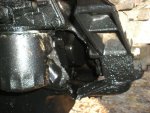I think it's more accurate to say that large, inefficient diesels run extremely hot. Small, efficient diesels have trouble making enough heat to warm the interior of the car. Some vehicles in Europe have small auxiliary diesel fired heaters to make heat in the winter.
I'm curious to know your thinking on this. I'm happy with the 300 in my 110, and am planning on eventually fitting one into my D2. The Td5 is significantly more work, so what advantages does it offer, besides easy and cheap power upgrades? What is repair-ability like when off the beaten path? The Td5 in the D2 has a dual-mass flywheel which I would not fit in a vehicle used off-road for a number of reasons. I understand there are single mass flywheels available on the market which many are opting for due to failures of the original.
Tdis are considered to be cool running, and over here there are plenty of idiots telling others to remove the fan or replace it with an electric fan, but the viscous units do a great job. The heater in my RRC works brilliantly from the Tdi (even though the viscous unit is seized and the fan turning at full effect), the Defender heater in my 109 struggling by comparison with a Tdi in the engine bay - it's the heater, not the engine which is the problem here -even though I had to replace the viscous fan with an electric unit on the 109 because the Discovery 200Tdi engine's fan is too low and close to the cross member and brake lines in a 109 conversion. A Defender 200Tdi has a different front end (just the timing case and water pump) with a higher mounted fan, so would have been better, but would also have cost five times more to buy as they are so in demand for retro-fits here. So, Tdis run at a reasonable temperature - warm enough that a decent heater will work well, not so hot that they struggle unless the vehicle is at very low speed and high work load for protracted periods and has had its fan removed.
The TD5 has more performance but is less refined than the 300Tdi, which is why the DII needed a dual mass flywheel (prone to failure, so LR sell a retro-fit solid flywheel and conventional clutch plate kit) and mass damper on the back of the LT230 transfer box. It also uses more fuel than the Tdi. The ECU has been known to cause some issues, mainly the oil migration in the harness or submersion in vehicles where the unit had not been water proofed or moved by the owner, but also allows easier tuning. Defender TD5s tend to be in good condition, but DII TD5 engines suffer much more frequent warped manifolds and sheared studs because the turbo already runs a higher and longer boost than the Defender (I believe the hardware is identical and that it's just an ECU setting). Get a chipped or remapped DII engine and you're almost guaranteed to have manifold trouble sooner or later.
The TD5 is an engine that runs very cool. DIIs have Webasto auxiliary heaters tucked into the front bumper to make the heater effective (TD4 Freelanders have the same thing too). Defenders didn't get this addition and their heaters are very ineffective. They also have a fuel heat exchanger to cool the fuel on its way back to the tank due to the high pressures in the injection system. Its common rail injection system is not tolerant of low quality diesel abd will not accept vegoil or other substitutes.
For what it's worth, diesels are most certainly not viewed as cool over here - they're practical and comparatively economical, with diesel costing a little more than petrol but going that much further, but everyone loves the V8 powered Land Rovers for their performance and gorgeous sound. The clatter and vibration of a diesel may suit a Defender, but it's unpleasant and out of place on a Discovery or RR. Don't make the decision based on what is perceived as "cool" - that sort of vanity is in itself very "uncool"! Make the decision based on vehicle requirements and cost.

